#ERP for pharma
Explore tagged Tumblr posts
Text
#erp#erp software#erp system#erp implementation#erp solutions#cloud erp#erp integration#erpsolutions#erp for manufacturing#erp development company#pharmaceutical manufacturing#erp for pharma#erp for distillery industry#distillery
0 notes
Text
Enhancing Workforce Management and Productivity in the Pharmaceutical Industry with ERPNext
In the fast-paced and highly regulated pharmaceutical industry, efficient workforce management and enhanced productivity are crucial. ERPNext for Pharma offers a comprehensive solution that integrates functions such as inventory management, supply chain operations, and compliance tracking, ensuring streamlined operations and regulatory adherence. By leveraging ERPNext, pharmaceutical companies…
#ERP For Pharma#ERPNext for Pharma#ERPNext Pharma Software#Pharma Business Success#Pharma ERP#Pharma Inventory ERP#Pharmaceutical Industry
1 note
·
View note
Text
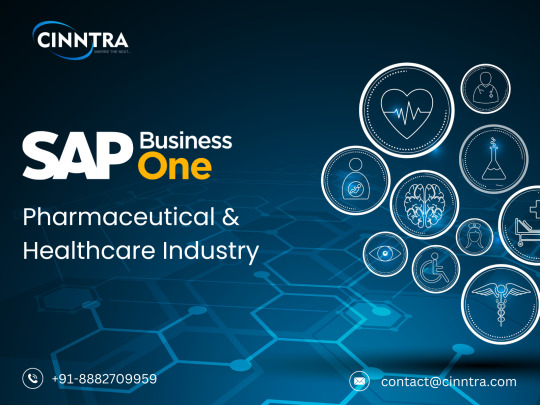
SAP B1 for the pharmaceutical and healthcare industry - Cinntra provides comprehensive software solutions tailored to meet the unique needs of this regulated sector. It streamlines operations, improves efficiency, and provides end-to-end functionality for finance, procurement, inventory management, manufacturing, sales, and customer service.
Get a free demo today
+91-8882709959
1 note
·
View note
Text
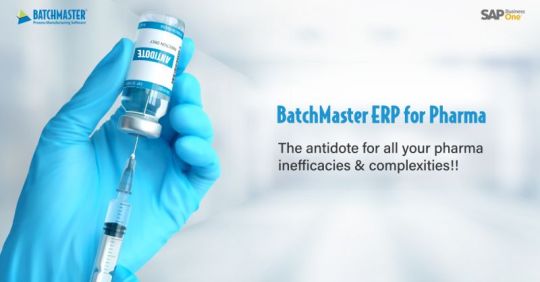
To sustain, survive, and thrive amid the fierce competition prevailing in the pharmaceutical sector, manufacturers must make sure that their production processes are efficient in order to bring drugs into market more quickly and economically than competitors. Get Pharmaceutical ERP Software to stay on top.
0 notes
Text
The Importance of Using Google Authenticator for Enhanced Security
In an era where cyber threats are growing at an unprecedented rate, securing online accounts has never been more critical. Passwords alone are no longer sufficient to safeguard personal and business data. Cybercriminals employ increasingly sophisticated techniques to breach security barriers, leading to financial loss, identity theft, and data breaches. One of the most effective solutions to counter these threats is two-factor authentication (2FA), and Google Authenticator stands out as a highly reliable tool in this domain.
Understanding Two-Factor Authentication (2FA)
Two-factor authentication (2FA) is a security process that requires users to provide two different forms of identification before gaining access to an account. Traditionally, logging in only required a username and password. However, this method is vulnerable to hacking, phishing, and credential theft.
With 2FA, even if an attacker acquires your password, they would still need the second form of authentication, typically a time-sensitive code generated by an authentication app like Google Authenticator. This extra layer of security significantly reduces the risk of unauthorized access.
What is Google Authenticator?
Google Authenticator is a free mobile application developed by Google that generates time-based one-time passwords (TOTP) for 2FA. When enabled for an account, it provides an additional layer of protection by requiring users to enter a code from the app alongside their regular password. The app does not require an internet connection to function and works on both Android and iOS devices.
How Google Authenticator Works
Enabling Google Authenticator – Users must first enable two-factor authentication on their online accounts and select Google Authenticator as their authentication method.
Scanning QR Code – A QR code is provided by the website or service, which the user scans using the Google Authenticator app.
Code Generation – The app then generates a six-digit TOTP every 30 seconds.
Verification – To complete the authentication process, users enter the displayed code within the timeframe.
Each time a user logs in, they will need to enter a new code from the Google Authenticator app, ensuring security even if their password is compromised.
Why is Google Authenticator Important?
1. Enhanced Security Against Cyber Threats
Google Authenticator provides a significant security upgrade compared to relying solely on passwords. Passwords can be easily stolen through phishing attacks, keyloggers, or data breaches. However, the dynamic and time-sensitive nature of authentication codes generated by Google Authenticator makes it nearly impossible for cybercriminals to gain unauthorized access.
2. Protection Against Phishing Attacks
Phishing is one of the most common methods used by hackers to steal login credentials. Even if a user mistakenly provides their password to a fake website, the attacker would still need the authentication code to gain access. Since the code is constantly changing, it adds a robust defense against phishing attempts.
3. Offline Functionality
Unlike SMS-based 2FA, which requires network connectivity, Google Authenticator works entirely offline. This eliminates risks associated with SIM swapping attacks, where hackers hijack a victim’s phone number to intercept authentication codes sent via SMS.
4. Faster and More Secure than SMS Authentication
Many services offer SMS-based authentication as a second factor, but this method has vulnerabilities. SMS codes can be intercepted, delayed, or redirected by hackers. Google Authenticator generates unique codes on your device, making it a faster and more secure option.
5. Wide Adoption and Compatibility
Google Authenticator is compatible with a vast range of services, including email accounts, social media platforms, banking applications, and cloud storage services. Major platforms such as Google, Facebook, Instagram, Twitter, Amazon, and Dropbox support Google Authenticator, making it a versatile and reliable tool for securing multiple accounts.
6. Simple and Convenient to Use
Once set up, Google Authenticator is simple to use. The codes are generated automatically, requiring no extra effort beyond opening the app and entering the displayed code when prompted. The app’s straightforward interface makes it user-friendly, even for those who are not tech-savvy.
Potential Drawbacks and How to Overcome Them
While Google Authenticator offers significant advantages, there are some challenges users may face:
1. Device Loss or Change
If a user loses their phone or switches to a new device, recovering Google Authenticator codes can be challenging. To mitigate this, users should:
Save backup codes provided during the initial setup.
Use Google’s built-in account recovery options.
Utilize a backup authentication app that supports cloud synchronization, such as Authy.
2. No Cloud Backup
Google Authenticator does not offer cloud-based backup, which means that users must manually transfer their accounts when switching devices. Some authentication apps like Authy offer cloud backup, but for maximum security, keeping codes stored locally remains a safer option.
3. One-Time Setup Complexity
For users unfamiliar with 2FA, setting up Google Authenticator for multiple accounts can feel cumbersome. However, most online services provide step-by-step guides to simplify the process.
How to Set Up Google Authenticator
To enable Google Authenticator on an account, follow these steps:
Download the Google Authenticator App from the Google Play Store (Android) or App Store (iOS).
Enable 2FA on the online service you wish to protect (e.g., Gmail, Facebook, Amazon, etc.).
Choose Google Authenticator as the preferred authentication method.
Scan the QR Code provided by the service using the Google Authenticator app.
Enter the Verification Code displayed in the app to confirm setup.
Save Backup Codes in case you lose access to your authenticator.
Conclusion
With cyber threats escalating daily, using only a password to protect online accounts is no longer sufficient. Google Authenticator is a highly effective tool that adds a critical layer of security through two-factor authentication. It protects against phishing, SIM swapping, and brute-force attacks while offering a simple, offline, and widely supported security solution. By integrating Google Authenticator into your security practices, you can significantly enhance the protection of your digital identity, financial data, and personal information.
Cybersecurity is a shared responsibility, and taking proactive steps like using Google Authenticator ensures that you remain one step ahead of cybercriminals. If you haven’t already enabled 2FA, now is the time to strengthen your security and safeguard your online presence.
#gst software#spine software#billing software#pharma#accounting software#distributor#industry#erp#india#software
0 notes
Text
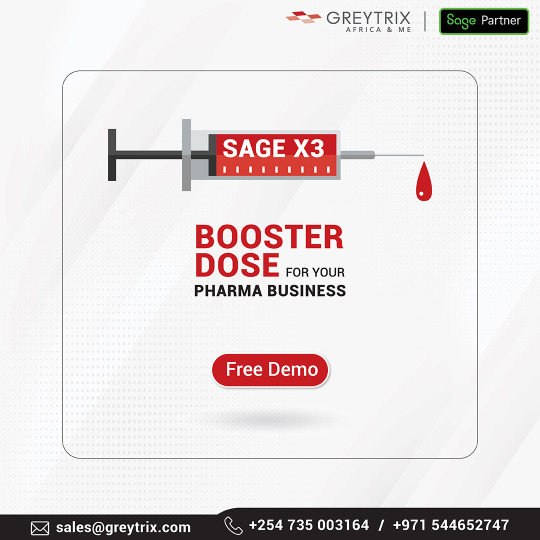
Pharma ERP
Sage X3 pharma ERP software enables companies to manage quality, production, supply chain operations, & regulatory compliance.
0 notes
Text
Discover the Future of Pharma with Zillancer’s ERP Solutions
Zillancer brings you specialized Pharma ERP solutions that transform your business by optimizing supply chains, enhancing productivity, and ensuring regulatory compliance. Let us guide your pharmaceutical company to new heights of efficiency and innovation.
#Pharmaceutical ERP#Pharma ERP Solution#ERP Pharma Software#ERP Software Pharma#ERP for Pharma Industry#ERP for Pharmaceuticals#ERP for Pharma Companies#Pharmaceutical ERP Solution#ERP for Pharmaceutical Industry#ERP Software for Pharma#Pharmaceutical ERP Systems#Best Pharma ERP Software#Pharmaceutical ERP Software#ERP System for Pharma Company#ERP Software for Pharma Industry#Pharmaceutical Manufacturing ERP#ERP for Pharmaceutical Companies#ERP Solution for Pharmaceutical Industry#ERP Systems for Pharmaceutical Manufacturing
0 notes
Text
Discover how Microsoft Dynamics 365 Business Central can transform the pharmaceutical industry with its powerful features. This blog post outlines seven significant benefits of adopting this all-in-one business management solution. From streamlining operations and enhancing regulatory compliance to improving financial management and enabling better decision-making, learn how Business Central can address industry-specific challenges and drive growth in the pharma sector.
#Microsoft Dynamics 365#Business Central#Pharma Industry#Digital Transformation#Business Management Solutions#Pharmaceutical Industry#ERP Systems#Efficiency in Pharma#Regulatory Compliance#Financial Management
1 note
·
View note
Text
Understanding the Internet of Things - IoT – Asrar Qureshi’s Blog Post #966

View On WordPress
#Asrar Qureshi#Blogpost966#Digital Space#Economic Potential#ERP#Internet of Things#IoT#Pharma Industry#Pharma Veterans
0 notes
Text
How ERP Enhances Compliance in Pharmaceutical Manufacturing
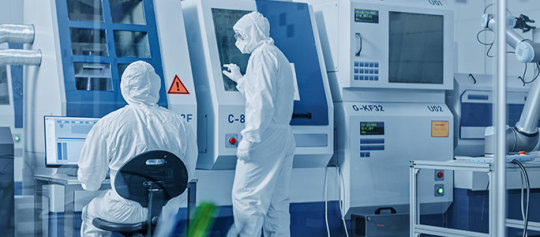
Compliance holds paramount importance in pharmaceutical manufacturing, given the stringent regulations and the critical role of pharmaceutical products in public health. Non-compliance can lead to regulatory penalties, product recalls, damage to reputation, and most importantly, risks to patient safety.
For instance, in 2013, the well-known pharmaceutical brand Ranbaxy was fined for cGMP violations, resulting in monetary losses and a dent in the company's trustworthiness.
The famous quote by former US Deputy Attorney General Paul McNulty, "If you think that compliance is expensive: try non-compliance," underscores the significance of compliance in this industry.
Adherence to Good Manufacturing Practices (GMP) and other quality standards ensures that pharmaceutical products meet stringent quality and safety requirements. Regulatory agencies such as the FDA and EMA enforce strict regulatory approvals to guarantee the quality, safety, and efficacy of drugs. Deviations from these standards can pose risks to patient safety and damage a company's reputation.
ERP systems play a pivotal role in streamlining compliance in pharmaceutical manufacturing by providing integrated solutions that ensure adherence to regulatory requirements. Here's how ERP streamlines compliance in this industry:
Documentation Management: ERP software for pharmaceutical industry centralize document management, including SOPs, batch records, and regulatory documents, ensuring organized and easily accessible documentation during audits or inspections.
Electronic Batch Records (EBR): ERP software facilitate the creation and management of electronic batch records, capturing detailed information about each manufacturing step to ensure data integrity, traceability, and compliance with GMP.
Quality Management: Pharma ERP software incorporates robust quality management modules that support quality control and assurance processes, ensuring compliance with regulatory standards such as cGMP and ISO 9001.
Inventory Control: ERP software offer real-time visibility into inventory levels, including raw materials, intermediates, and finished products, ensuring compliance with regulations related to inventory management and lot traceability.
Regulatory Reporting: Pharmaceutical ERP automates the generation of regulatory reports required by agencies such as the FDA and EMA.
Supplier and Vendor Management: ERP systems streamline the qualification and management of suppliers and vendors by maintaining records of supplier certifications, audits, and performance evaluations, reducing the risk of non-compliance with regulatory requirements.
In the pharmaceutical industry, compliance is essential for maintaining consumer trust and safeguarding public health. ERP Software is a comprehensive solution designed to meet the industry's specific needs while ensuring compliance with regulatory norms. With over 3000 clients globally, BatchMaster ERP is a trusted choice for pharmaceutical organizations.
0 notes
Photo

Pharmaceutical manufacturing operations can be consolidated and integrated using SAP B1 ERP software.
Get a Free Demo Today!👇
☎️ +91-8882709959
1 note
·
View note
Text
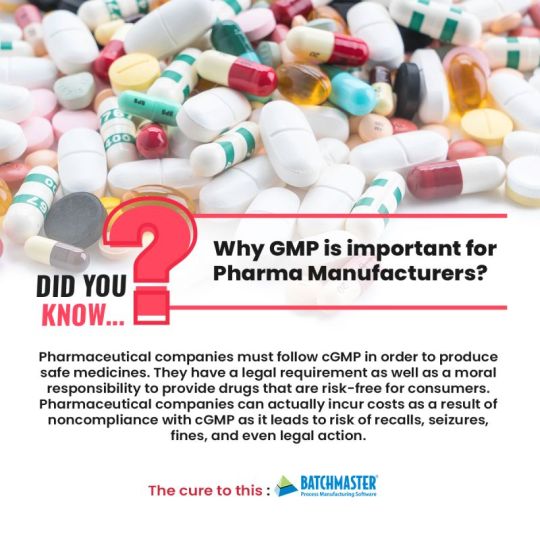
Time for an important pharma-related fact that should never be ignored. Read the post to know more-
#ERP in pharma#ERP pharma#ERP for pharma#Pharmaceutical ERP Software#Pharmaceutical ERP Systems#pharmaceutical ERP#Pharma ERP Software
0 notes
Text
Pharma ERP vs. Generic ERP: Tailoring Solutions for the Pharmaceutical Sector

The pharmaceutical sector in the UK not only fortifies the healthcare infrastructure but also makes significant contributions to the country’s economy. A multitude of domestic and multinational companies operate within this sector, specializing in the production of a diverse range of pharmaceutical products.
Despite the favorable business environment in the UK, pharmaceutical manufacturers encounter various challenges such as pricing pressures, stringent regulations, and uncertainties related to Brexit. However, challenges often bring forth new opportunities for growth. By embracing advanced manufacturing technologies, pharma manufacturers based in the UK can achieve long-term success even in this competitive business environment.
This is where Enterprise Resource Planning (ERP) software for the Pharmaceutical sector becomes indispensable. However, manufacturers frequently make the mistake of adopting a Generic ERP instead of an industry-specific pharma ERP software.
An industry-specific pharma ERP is a tailored solution designed to address the unique challenges faced by pharma manufacturers. Let’s delve into the details and understand how a tailored pharmaceutical manufacturing ERP software differs from a Generic ERP software.
Generic ERPs are prone to process mismatch due to the absence of industry-specific operations, whereas pharma ERP is meticulously curated for industry verticals and their micro-verticals.
Generic ERP software is developed to meet the generic needs of businesses and may include many features that are not pertinent to the pharma industry. This surplus of features can impede system performance. In contrast, a tailored pharma ERP will only include the essential features as per the pharma industry's requirements, making the software lightweight and fast.
A pharma ERP software empowers manufacturers to define individual production schedules for different products like capsules, tablets, soft gels, syrups, etc., which may not be achievable with a generic ERP solution.
Additionally, pharmaceutical ERP software is engineered to facilitate pharma-specific procedures such as milling, compounding, granulation, hot melt extrusion, etc., whereas a generic ERP may lack such capabilities.
By comprehending the pharma industry’s environment, a tailored pharma ERP creates a business model that ensures compliance with all industry-specific, local, and international regulations such as FDA CFR Part 11, Bioterrorism, cGMP, etc. Generic ERP may or may not incorporate these regulations.
These are just the tip of the iceberg. A pharma-specific ERP is undoubtedly a superior option compared to a generic manufacturing ERP software in UK. If you are a drug manufacturer aiming to streamline your operations efficiently, then adopting an industry-specific solution like BatchMaster would offer you more chances of success and a competitive advantage in the long run.
0 notes
Text
Best Billing Software 2024 | Varthagamsoft
உங்கள் தற்போதைய Billing Software-��் சிரமப்படுகிறீர்களா? இந்த நிதியாண்டில் உங்களின் வணிகத்தை எளிதாக்க VarthagamSoft- வுடன் இணைந்திடுங்கள்.
இன்றே அணுகுங்கள் இலவச டெமோவிற்கு
Contact No: 044-40-139-140
Website: varthagamsoft.com

#software#billingsoftware#erp#erp systems#distributor#pharma#medical#pharmacybillingsoftware#erp solution#varthagamsoft
0 notes
Text
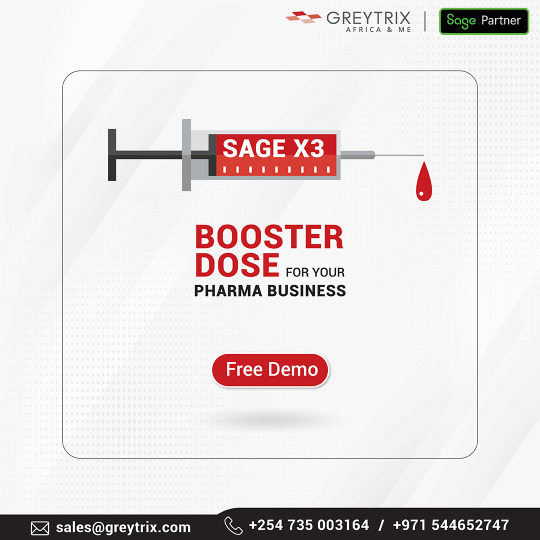
Pharmaceutical ERP Software
Sage X3 pharmaceutical ERP software enables companies to manage quality, production, supply chain operations, & regulatory compliance.
#greytrix middle east#erp software#sage erp#sage x3#pharmaceutical industry#pharmaceutical#pharma industry
0 notes